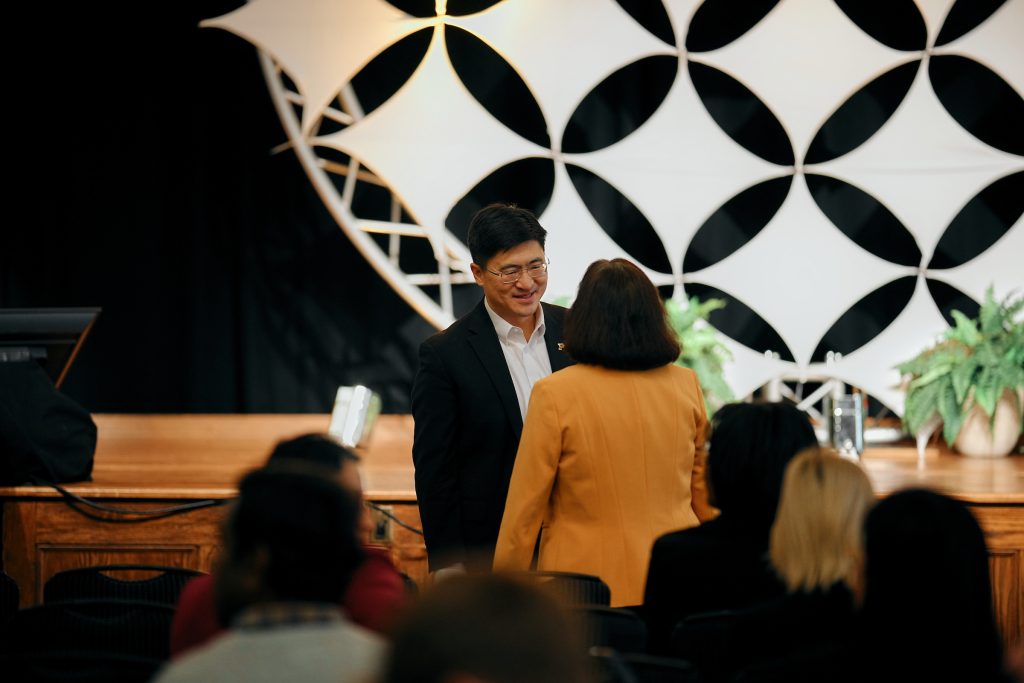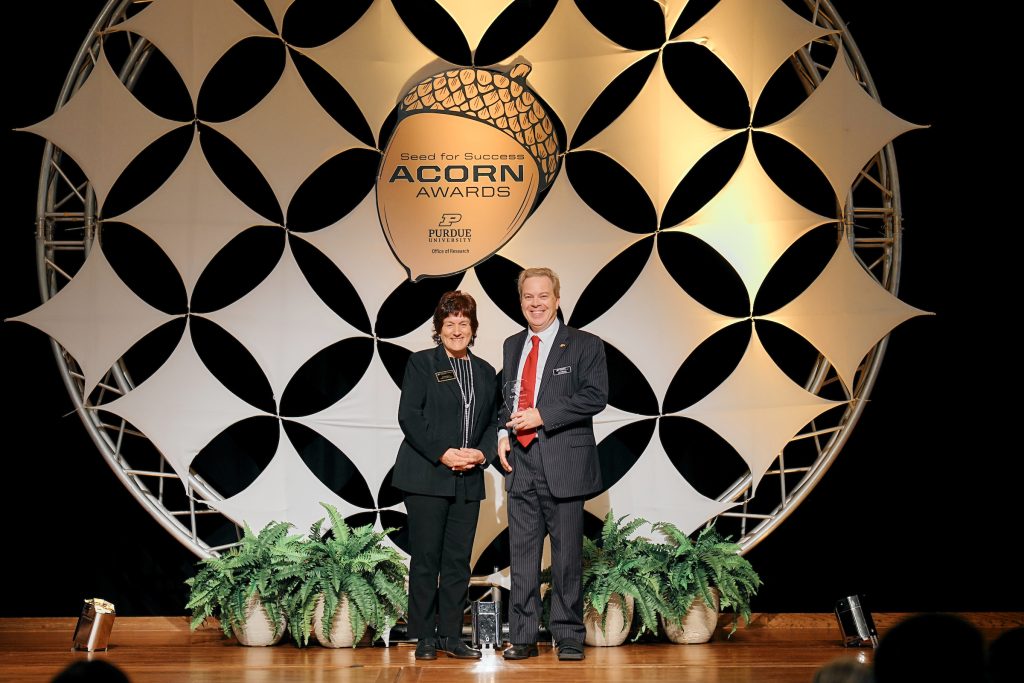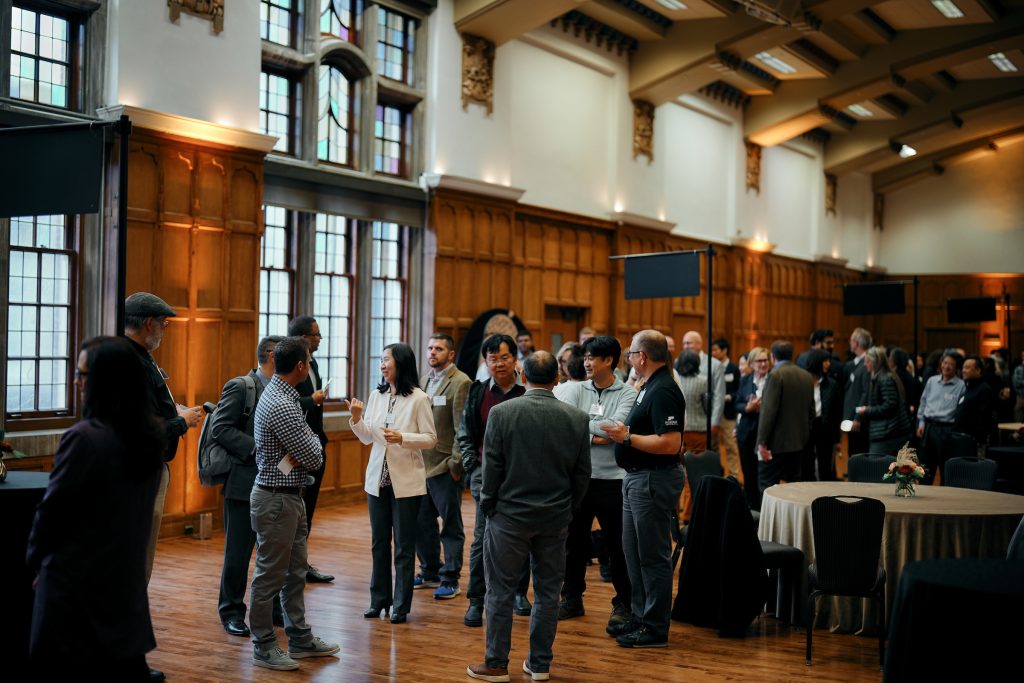WEST LAFAYETTE, Ind. – Seven members of the Purdue Applied Research Institute (PARI) were among the 275 people honored Wednesday (Nov. 13) with the Purdue University’s Office of Research 2024 Seed for Success Acorn Awards, recognizing projects that secured funding of $1 million or more for a single proposal in fiscal year 2024.
Karen Plaut, executive vice president for research, led the award presentation on campus at the Purdue Memorial Union. President Mung Chang addressed the crowd and lauded the awardees for their achievements.
PARI President and CEO Mark Lewis congratulated the PARI Acorn Awardees, whose projects garnered more than $6.5 million total for their respective endeavors.
“It’s an honor to have some of PARI’s top research leaders so recognized, as they are truly at the forefront of PARI’s mission to bridge the gap between scientific discovery and real-world applications,” Lewis said. “Their projects are translating cutting-edge research into practical, innovative solutions for industry and government agencies, helping to ensure that academic advancements can translate effectively into tangible benefits for society.”






Scenes from the 2024 Acorn Awards. Top row from left: Purdue President Mung Chang talks to an awardee; The Union on campus hosted a capacity crowd for the event; Karen Plaut, executive vice president for research, with Amit Varma, who leads PIIL and is an awardee. Bottom row from left: Plaut with PARI COO Kevin Massey, an awardee; the set of the Acorn Awards; guests mingle following the presentation. Photos: Tate Kirgiss
Awardees and their projects are:
James Braun, principal investigator; Travis Horton and Panagiota Karava, co-principal investigators
NSF Engines: Type 2: NSF Innovation Engine for Next-Generation Factory-Built Housing (NextHouse), National Science Foundation, $1 million
This development grant is to create a NextHouse ecosystem that can compete for a $160 million award from NSF’s Regional Innovation Engines program. Ultimately, this would establish Indiana and southern Michigan as the Silicon Valley for sustainable, cost-effective, factory-built housing. The NextHouse regional ecosystem includes partnerships with the University of Michigan, Notre Dame, Michigan State, Ivy Tech Community College and Lansing Community College. Braun, a Herrick Professor of Engineering and director of the Center for High Performance Buildings, and Travis Horton and Panagiota Karava, professors of civil engineering, are on the PARI team leading this effort.
Amit Varma, principal investigator; Sanjeev Malushte, co-principal investigator
Steel Composition Construction Qualification Study Phase 2, Los Alamos National Laboratory, $1.2 million
Steel-plate composite construction technology is key to deliver modular construction solutions that result in structures with superior performance and shorter construction schedules. Los Alamos National Laboratory selected the PARI team of experts to develop preliminary design solutions for representative blast chambers, and to perform mockup, testing and benchmarked simulations to qualify the steel-plate-composite-based design approach as being equal or better than the conventional blast-resistant design approach. Varma and Malushte are both leaders in the PARI Infrastructure Innovation Lab; Varma is the Karl H. Kettelhut Professor in Purdue’s Lyles School of Civil and Construction Engineering and the executive director, and Malushte is a distinguished fellow and senior director of technology.
Sanjeev Malushte, principal investigator; Amit Varma, co-principal investigator
Geotechnical and Structural Engineering Reviews for Liquified Natural Gas Facilities, Federal Energy Regulatory Commission, $1.6 million
The Federal Energy Regulatory Commission (FERC) must review and approve engineering deliverables for liquified natural gas facilities, which are complex as well as mission critical. PARI competitively won the bid to perform expert structural and geotechnical engineering review services for assisting FERC in its regulatory mission. PARI’s selection was based on the collective experience, reputation and technical expertise of its team members and their outside network of subject matter experts. Malushute and Varma collaborate on this project as well.
Kevin Massey, principal investigator; Darren Crum, co-principal investigator
PARI Westgate Workforce Development, Department of the Army, $2.6 million
PARI is supporting the Defense Department’s Trusted & Assured Microelectronics program, managed by Naval Surface Warfare Center, Crane Division. To answer NSWC Crane’s need for a presence near the Indiana base, the PARI Microelectronics Lab was established this year. It has quickly grown to eight full-time employees located in the vicinity of Crane. With this work, the PARI Microelectronics Lab is developing a sustained microelectronics workforce development pipeline that combines relevant and impactful defense projects with student education. Purdue students conduct aspects of this project, which include modeling, simulation, test and characterization of advanced packaging technologies for extreme environments. Massey is chief operating office of PARI, and Crum is director of the PARI Microelectronics Lab.
ABOUT PARI
The Purdue Applied Research Institute (PARI) creates inventive solutions to global challenges with partners in government, non-governmental organizations and the private sector. Building on Purdue University’s world-class expertise, PARI bridges the gap between academia and real-world application. We channel our expertise in engineering, agriculture, science and technology into tangible solutions in national security, global development and critical infrastructural needs.
Media contact: Evamarie Socha, ecsocha@purdue.edu